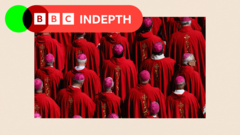
The Papacy in Transition: Legacy of Reform and Future Directions
A Church at a Crossroads: Reflecting on a Decade of Change
As the papacy of Pope Francis nears its conclusion, conversations surrounding his legacy and the future direction of the Catholic Church are intensifying. Over the past decade, Francis has implemented a series of reforms aimed at modernizing the Church's operations, fostering greater inclusivity, and addressing pressing global challenges. While many applaud his efforts as necessary and progressive, others express concerns about potential disruptions to long-held traditions and doctrines. The question remains: should the next pope continue down the path of reform, or should they steer the Church in a different direction?
The Francis Effect: Key Reforms and Initiatives
Pope Francis's papacy has been marked by several significant initiatives. Some of the most notable include:
- Financial Transparency: Increased scrutiny of Vatican finances and efforts to combat corruption.
- Decentralization of Power: Granting greater autonomy to local bishops and dioceses.
- Emphasis on Social Justice: Vocal advocacy for the poor, marginalized, and refugees, along with strong stances on climate change and economic inequality.
- Interfaith Dialogue: Promoting understanding and collaboration with other religious traditions.
- Pastoral Approach: Emphasizing mercy, compassion, and a more welcoming attitude towards divorced and remarried Catholics and members of the LGBTQ+ community.
These reforms have resonated with many Catholics and non-Catholics alike, who see Francis as a breath of fresh air in an institution often perceived as rigid and out of touch.
Supporters' Perspective: Building on a Foundation
Proponents of continuing Francis's reforms argue that they are essential for the Church to remain relevant in the 21st century. They believe that his emphasis on social justice, inclusivity, and dialogue is crucial for addressing the complex challenges facing humanity. Furthermore, they contend that his efforts to modernize the Church's governance structures will improve accountability and efficiency.
Some specific arguments in favor of continuing the reforms include:
- Strengthening the Church's credibility by addressing issues of financial mismanagement and abuse.
- Empowering local communities to better respond to the needs of their congregations.
- Attracting younger generations to the Church by demonstrating a commitment to social justice and environmental stewardship.
- Fostering greater unity among Christians and other faith communities through dialogue and collaboration.
Critics' Concerns: Preserving Tradition and Doctrine
Conversely, critics of Pope Francis's reforms express concerns that they are undermining traditional Church teachings and practices. They fear that his emphasis on inclusivity and dialogue may lead to a watering down of core doctrines. Additionally, they worry that decentralization of power could create confusion and division within the Church.
Specific concerns raised by critics include:
- Concerns about potential changes to the Church's teachings on marriage and sexuality.
- Fears that the focus on social justice is overshadowing the importance of evangelization and personal conversion.
- Worries that decentralization will lead to a loss of unity and consistency in Church teaching and practice.
- Discomfort with what they perceive as a departure from traditional liturgical practices.
Looking Ahead: The Challenges Facing the Next Pope
The next pope will inherit a Church deeply divided over the legacy of Pope Francis. He will face the daunting task of bridging these divisions while also addressing a range of other challenges, including:
- Declining Church Attendance: Addressing the increasing number of people who are leaving the Catholic Church, particularly in Western countries.
- The Abuse Crisis: Continuing to address the ongoing scandal of sexual abuse and working to prevent future abuses.
- Global Conflicts and Humanitarian Crises: Responding to the numerous conflicts and humanitarian crises around the world.
- Economic Inequality: Advocating for policies that promote economic justice and reduce poverty.
- Environmental Degradation: Taking action to protect the environment and combat climate change.
Finding Common Ground: A Path Forward
Regardless of their views on Pope Francis's reforms, most Catholics agree that the next pope must be a leader who can unite the Church and guide it through these turbulent times. He will need to be a person of deep faith, intellectual rigor, and pastoral sensitivity. He will also need to be a skilled communicator who can effectively articulate the Church's message to a rapidly changing world.
The future of the Catholic Church hinges on the ability of the next pope to navigate these complex challenges and find common ground among its diverse members. Whether he chooses to continue down the path of reform or chart a different course, his decisions will have a profound impact on the lives of millions of people around the world.
```